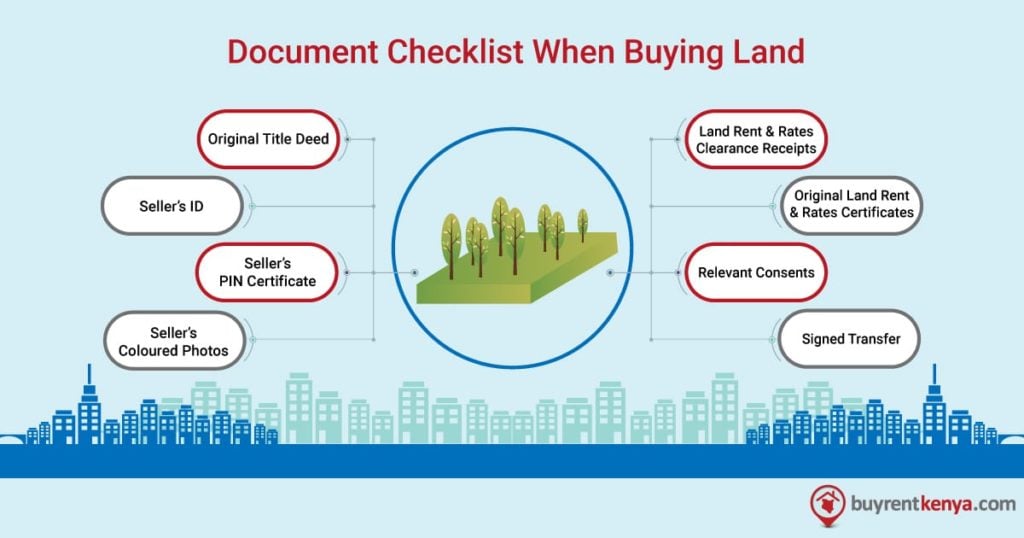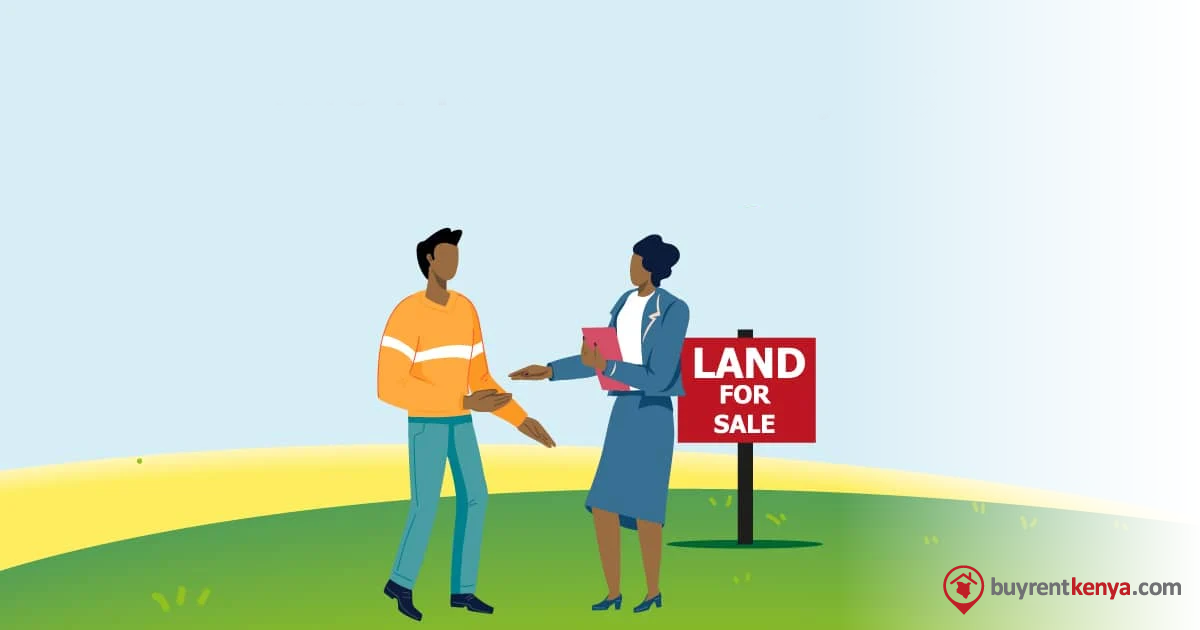You must have heard the saying, “buy land, they are not making it anymore”. Which is true. The main reason why most people buy land is to invest in something they can start from scratch and see its benefits.
It could be a future home for you and your family, a place to start farming, build residential or commercial property as an investment opportunity.
Regardless of the reasons, there are certain things you should consider buying land in Kenya.
Table of Contents
The Legal Process of Buying Land in Kenya
It is advisable to find a lawyer to help you through the legal process of buying land in Kenya. Reason being, they understand what is required, they know the ins and outs of the process and all the documentation required to make the process seamless.
The steps of buying land include:
1. Find the Land
The fastest way to find land to buy in Kenya is by searching online. When using a property portal such as BuyRentKenya, you can filter your search according to location and price, two of the most common things people consider when searching for land.

You can also ask for recommendations from your networks to advise on locations where they know there is available land for sale.
2. Carry Out a Land Search
Once you find the land and talk to the seller, ask for a title deed to help you do the land search, which is free, on the new Ardhisasa platform. The results will come out immediately once the property has been added to the system and is verified by the Ministry of Lands.
You will need to register an account to perform the land search. The system will ask for your National ID and Serial Number, email address, phone number and coloured passport-size photo. Currently, it’s only Kenyans who can register on the platform.
The land search results will tell you who owns the land, the size, and if there are any caveats associated with that plot of land.
All property owners must be registered on the Ardhisasa platform.
3. Conduct a Search Where the Land is Located
If you are buying land outside Nairobi, you will need to conduct a search at the respective Registry where the land is located. For instance, if the land is in Machakos, check with the Survey office in Machakos.
Different counties have different charges for this search. The Ministry of Lands has all the contact details for Land Registries.
This search will also help you know if the land has any pending land and rents rates owed to the government. If there are any, the seller should clear them before transferring ownership to you.
Make sure you get a copy of the land rent and rates clearance certificates and receipts that show no pending rates to pay.
4. Get Survey Maps
Survey maps will help you know where the boundaries of the land should be. The Ministry of Lands provides survey maps upon request. You can also buy the maps from a surveyor.
After getting the maps, visit the land with the surveyor and the seller to mark boundaries on the piece of land to avoid disputes during the sale process.
A visit to the land is also to ensure that you are buying land that exists.
5. Ensure the Seller Has Consent
Depending on the type of land you are buying, the seller needs to show you that they have permission to sell the land. A lawyer will help you in this stage because different types of land require different consents.
6. Sign the Sale Agreement
The sale agreement is a legally binding document drawn up by the seller’s lawyer. This agreement protects both the seller and the buyer to ensure that you each benefit from the sale.
You will fill three copies of the agreement: one for you, the seller and the lawyer. It will have:
- Buyer and seller details
- Land description
- Cost of the land and payment timelines
- Who pays for what during the process
- And what happens if there is a breach of contract
Not forgetting the hidden charges: stamp duty of 4% of the value of the land in urban areas and 2% in rural areas. Legal fees are dependent on the value of the land. If the land costs below Kshs 5M, the lawyer will charge a minimum of Kshs 35,000.
All these costs are in the sale agreement.
7. Land Transfer
Once you complete all the payments, the seller then prepares and signs the land transfer documents to the buyer. Your lawyer should help you with this process to ensure that you get what you are paying for.
The seller should have relevant consent to facilitate the transfer of land ownership through the Ardhisasa online portal.
What to Know Before Buying Land in Kenya
To ensure that you make the right purchase and avoid getting scammed in the process, here is how to carry out due diligence when buying land.
1. The Type of Land
Before you decide to buy any piece of land, it is important to know the intended purpose of the land i.e. if it is for agricultural, residential, commercial or industrial purposes. The seller should have this information.

In addition to that, you should know the type of ownership you will have. In Kenya, it is either:
Freehold: You’ll own the land indefinitely so long as the conditions of ownership don’t change.
Leasehold: The leasehold tenure will allow you to own land for a limited time with an option of extending the tenure upon expiry. The Kenyan constitution limits non-citizens to a maximum tenure of 99 years.
Having an idea of how the land is used enables you to know whether it is a good investment.
Additionally, if you ever decide to subdivide your land, potential sellers might have different ways of using your land. Knowing the type of land will show that you know what you are talking about during the sale.
2. Know the Typography
Within the first stages of looking for land to buy, you’ll probably search for it either online or ask your friends or family for recommendations. You won’t be able to see the physical vacant land to get a glimpse of the surrounding area.
Google Earth has a cool feature where you can visualize and analyze the location you want to invest in.
3. What Utilities Does the Land Have?
Another crucial aspect to look at before buying vacant land is the presence of utilities such as water and electricity or lack thereof. In some areas, the seller has already installed these on the property.
You could also add these for yourself at a cost, like digging a borehole. Because most people buy land to build on, knowing this information will help you include some of these costs in your budget for better planning.
4. Is It on Riparian Land?
You must have seen or heard sad stories about people losing their homes during the rainy season from flooding because the property was close to a river or water stream.
You don’t want to find yourself in a situation that will force you to move after building your home. Remember, building on riparian land is illegal in Kenya.
You can find out more details about the property by performing a free land search on the Ardhisasa.
You can also get a surveyor to survey the place and tell you more about the location and the boundaries to know if there is any water body surrounding the land you want to purchase.
5. Does the Land Have Road Access?
Is there a pathway or road leading to the land in question? This might sound obvious but there are places without a road and a path has to be created to get to the land. You don’t want to invest in a place that gives you a headache trying to access it.
Even worse, is if the road is on someone else’s property. Meaning, you have to pass through their land to get to your destination. Therefore, get the finer details from the seller and visit the place for yourself before making a purchase.
6. Avoid Getting Conned
We cannot stress this enough – do not pay for anything you have not seen. So many people fall for this scam. They’re shown pictures of vacant land and don’t perform due diligence only to find out they were sold land that belongs to someone else. Imagine the horror!
Ask for the title deed and remember to carry out a title search to determine if the land has a previous owner.
FAQ
The price of land in Kenya depends on the size and area of the land. For example, a one-acre land in Kiambu would range between Ksh 5,000,000 to Ksh 50,000,000 or even more.
For more information, visit the following link: https://www.buyrentkenya.com/land-for-sale
Stamp duty is charged at 4% of the value of the land in urban areas and 2% in rural areas.
You need to first find the land you want to purchase. Once that is done, you need to carry out a search of the land and the seller to ensure that the name on the title matches the said owner of the land. It is best practice to have a lawyer assist you in the process of purchasing any type of property.
To Sum Things Up
Due diligence when buying land in Kenya will save you time and money in the long run. It might seem like a complicated process but it’s worthwhile in the end.
Lastly, here is a summary of the important documents you will require throughout the process:

Looking to buy a piece of land from trusted agents, look no further. Search for land within your price range in a location you’re interested in.



